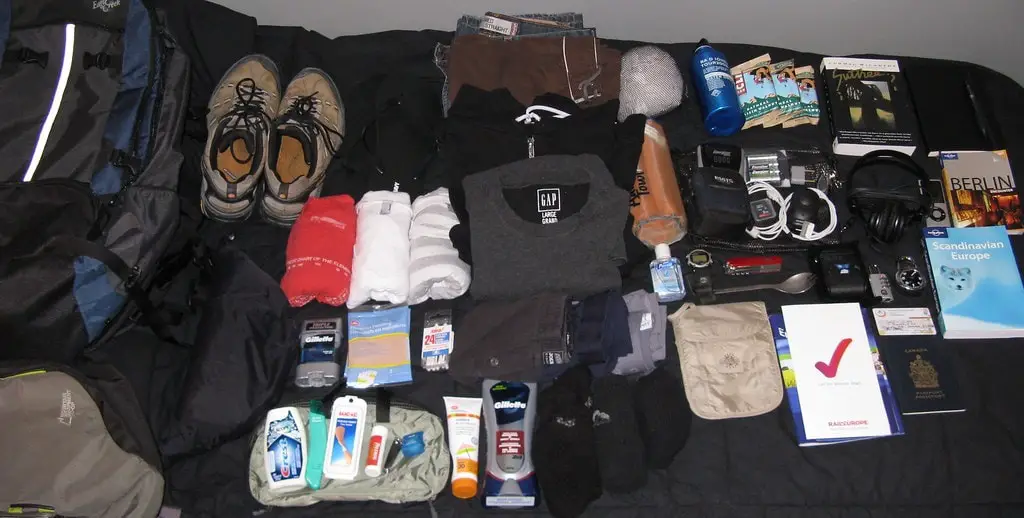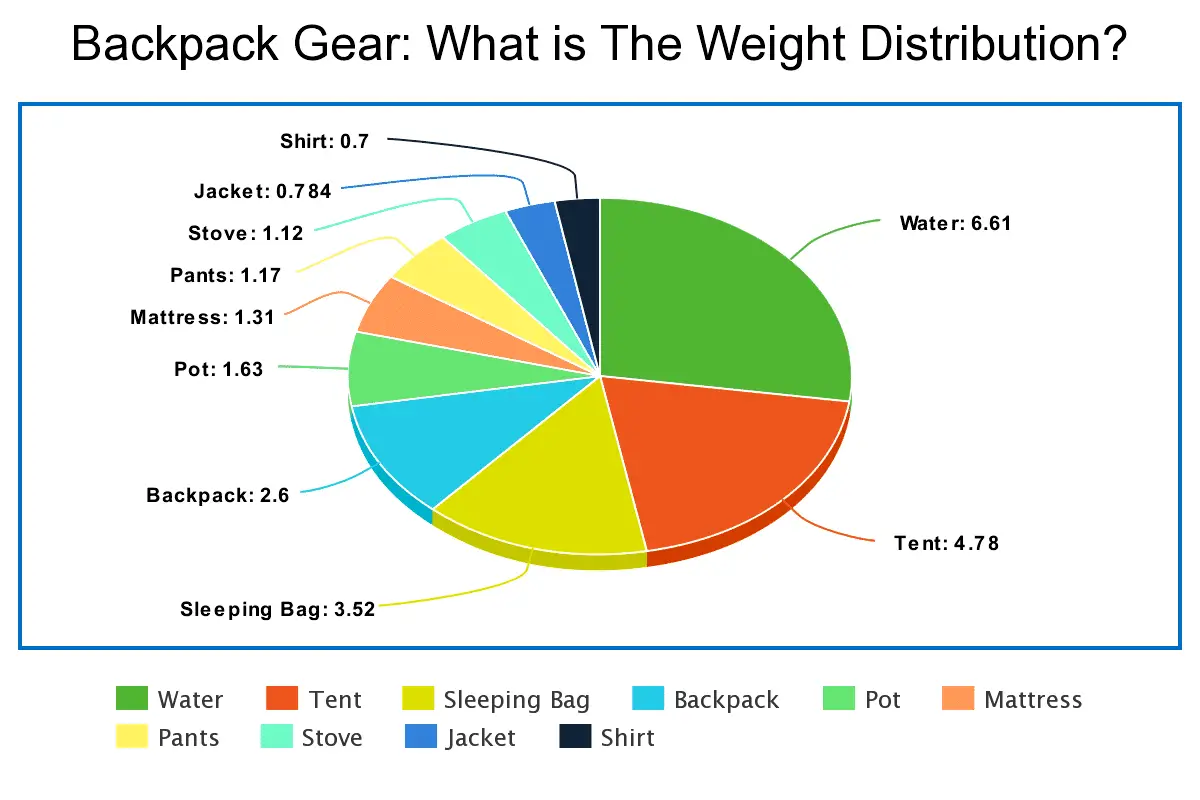You can’t backpack with an excessively heavy bag. Backpacking requires a lot of movement. And if your pack is so heavy that you can barely stand straight, you are going to hate every minute of your trip. But how much should your backpack weigh? Is there a way to determine beforehand how much you should pack?

When you carry the most crucial gear for camping, your backpack should weigh around 24 lbs (including sleeping, cooking and camping equipment; plus hydration). Another way is to calculate 20% of your body weight – this would be the maximum you may carry. Nevertheless, this way, you do not take into account your own body weight and physical capabilities.
Average Weight Estimation (With 50 Examples)
To assess the desired weight of your backpack, I will be taking into account the essential gear you shouldn’t handle without.
The numbers may vary between campers; it is undoubtedly up to your preference. Nevertheless, I would try to stick to the minimum with merely the gear required to a comfortable experience.
In general, there are three categories your equipment will fall into – sleeping equipment, clothing and cooking (hydration included).
Within the sleeping group, you would carry a tent, a sleeping bag, a mattress, and a hiking backpack to carry these. When it comes to clothing, you would probably pack a shirt, pants and a jacket. Regarding cooking & hydration, you would bring a stove, a cooking pot and three liters of water.
For each item, I’ve randomly gathered you five examples so that you get the estimated, desired weight of your backpack:
| 3-Season Tent | Sleeping Bag | Sleeping Mattress |
| Hyke & Byke Zion – 3.81 pounds | Coleman Sunridge – 4.3 lbs | Sleepingo – 0.9 lbs |
| Naturehike Cloud – 3.97 pounds | MalloMe Single – 4.5 lbs | Overmont – 2.65 pounds |
| Campla Tent – 5.31 pounds | REVALCAMP Bordeaux – 1.2 lbs | WELLAX – 1.08 pounds |
| Winterial 3 Person – 5.31 pounds | oaskys – 3 lbs | Outdoorsman Lab – 0.96 pounds |
| Mountainsmith – 5.53 pounds | Sportneer – 4.6 lbs | INTEY Inflatable – 0.95 pounds |
| Average: 4.78 lbs | Average: 3.52 lbs | Average: 1.31 lbs |
| Pants | Shirt | Hiking Backpack |
| Columbia Royce Peak – 1 lbs | Baleaf Men’s – 0.43 lbs | TETON 3400 – 4.5 lbs |
| Columbia Anytime – 0.65 lbs | Columbia PFG Bahama – 1 lbs | Venture Pal – 0.7 lbs |
| Columbia Trail Pant – 3 lbs | Columbia PFG Blood – 0.83 lbs | TETON 1100 – 2 lbs |
| prAna Halle – 1 lbs | Columbia Terminal – 1 lbs | Loowoko 50L – 2.6 pounds |
| CQR Tactical – 0.2 lbs | Columbia PFG Bahama – 0.26 lbs | Talus 2700 – 3.2 lbs |
| Average: 1.17 lbs | Average: 0.7 lbs | Average: 2.6 lbs |
| Cooking Pot | Camping Stove | Jacket |
| Open Country – 0.55 lbs | MSR PocketRocket 2 – 0.16 lbs | Diamond Candy – 0.7 lbs |
| MSR Alpine – 1 lbs | TOMSHOO – 1.3 lbs | poriff Rain Jacket – 0.66 lbs |
| Sailing 5-Piece – 0.85 lbs | Primus – 0.55 lbs | Columbia Glennaker – 0.8 lbs |
| GSI Outdoors – 4.41 lbs | Coleman Sportster – 2.35 lbs | The North Face Resolve – 1.1 lbs |
| MyLifeUNIT – 1.32 lbs | Jetboil MiniMo – 1.25 lbs | Marmot PreCip – 0.66 lbs |
| Average: 1.63 | Average: 1.12 lbs | Average: 0.784 lbs |
Data Summary
When summarizing the average weight of each category, it brings us to a total of 17.614 lbs. Now, you should add to this the amount of water you are willing to carry.
In general, you need around 2 liters of water a day to survive. Although that is the minimum amount; when hiking long distances, you should carry at least 3 liters, which are 6.61 lbs.
Therefore, your backpack should weight around 24 pounds (your gear plus drinking water). Remember, this is a rough estimation – I’ve only gathered five random examples for each piece of equipment.
Also, it is very likely that you might need additional gear – a headlamp, a GPS, a soap, towels and so on. Still, I would say that your hiking backpack shouldn’t exceed that number by much – this is the desired average.
Here is a handy pie chart of the weight distribution of the hiking backpack. Note that the most substantial part is due to the tent and the drinking water. Later on, I will explain how to reduce these two.

The 20% Rule of Thumb
Some people believe that your backpack shouldn’t weigh more than 20 percent of your body weight. This applies specifically to loaded backpacking packs.
In other words, a 150-pound man should carry a 30-pound bag. With full day hiking packs, that number falls to 10 percent. Simply put, your body weight is the best measuring tool for the appropriate weight of your backpack.
The Individual Approach
The idea that a backpack should only weigh a percentage of your body weight is widely accepted. However, that notion has led to the belief that people with higher body weight can carry more heavy packs than people will lower body weight.
But this isn’t necessarily true. In fact, there is a good reason to believe that the idea that your backpack must weigh 20 percent of your body weight is false. People who tout this idea fail to realize that the hiker carries not just their bag but their own body weight.
And it is the failure to account for the backpacker’s body weight that has led to the erroneous assumption that a backpack should weight 20 percent of the carrier’s body weight.
There is no definitive measure for determining the right weight for a backpack because there are too many variables to consider.
You might find that a larger hiker can only carry a bag that is 14 percent of their body weight because their load is the sum of the backpack and their own body weight.
On the other hand, a smaller hiker might comfortably carry a backpack that is 45 percent of their body weight because their personal weight isn’t much of a factor.
How Can You Determine The Right Weight For Your Backpack?
There are tools on the internet that can help you to calculate the right weight for your backpack. But if you want to make this determination the old fashioned way, you have to take two things into account:
The Intended Duration
How long is your trip? How far do you intend to go? The answer to that question will determine the amount of food and water and resources you need to take with you.
If you choose to stick with the old method of keeping your pack at 20 percent of your body weight, there are ways to apportion your resources in a manner that allows you to prepare adequately for your trip while also staying within the limit.

Weather Conditions
The climate conditions are going to determine the constitution of your luggage. If your destination is cold and wet, then you will require heavier clothing, possibly even waterproofed items.
Sunny weather, on the other hand, will encourage you to pack light. In a way, the weather is the most restrictive factor because it doesn’t give you much choice. It doesn’t matter whether or not you have space in your pack for extra blankets. If the season calls for it, you must add the weight.
Preferences also matter. Yes, the duration of your trip and the weather have a strong say. But what you want will also come into play. If you can’t sleep without a comfortable hammock or a luxury robe, then you must willingly contend with the weight they will add to your pack.
If the idea of wearing the same old clothes every day doesn’t bother you, then you will find it much easier to keep your pack light. Try to remember. There are only three things you need to survive on a trip:
- Everyone needs clothes. The geography determines the clothing items you can bring.
- Everyone needs toiletries. For some people, that merely means toilet paper. Other people require a menagerie of exceptional creams, potions, and powders. This is where personal preferences come into play.
- Everyone requires electronics. Sometimes a communication device is enough. Other times, you might need a radio of some sort to keep you entertained in the night, or even more sophisticated tools for cooking and preserving your campsite lit.
The weight of your backpack will largely depend on the number of items you apportion each of those three areas. Even though you definitely need toiletries and clothing and electronics, the less you carry, the better. So you need to make sure that you only pack the necessary components.
How Can You Make Your Backpack Lighter?
Experience is the best teacher. And most hikers and backpackers never notice that their pack is too heavy until they pick it up and go backpacking. Of course, by then it is too late.
But once they learn their lesson, the next time they go backpacking, they will make it a point to minimize the weight of their pack.
Then again, is there a way to lighten your load? No one walks out of their door with an excessively heavy backpack because they want to. In most cases, if your bag is too heavy, it’s because you have too many basic requirements and your pack is the best place to store them.
So is there a way to lighten your pack without leaving the essentials behind? The answer to that question is a definitive yes. Try the following:
Backpack Selection
This is where you should always start. Make sure your backpack isn’t too heavy, to begin with. Think about the material from which it is made, the kinds of zippers it uses, the number of pockets it has.
Make sure that the pack isn’t adding more than four pounds to the weight of your luggage. There are light backpacks with innovative designs that will contain all your essential items while also appropriately distributing their weight. Of course, decent packs are not cheap.
Avoid models with large frames. Frameless or foam-stiffed packs can take one and a half kilograms off your total backpacking weight.
Shelter Opportunities
Do not automatically assume that you will require a tent when you go backpacking. Your choice of shelter will constitute a significant portion of your backpack’s overall weight. The sleeping bag on its own can weigh between 450g and 1.2kg.
So if your destination is a dry and sunny location with little to no bugs, consider going without any shelter. Just get comfortable under the stars with a warm blanket to keep you company.
You can shave so much weight off your backpack by removing the tent. If comfort is an issue, improvise. Buy a hammock or a tarp or a cozy sleeping bag. If you can’t survive without shelter, make sure your tent is ultra-light.
An ultra-light but comfortable tent boasting all the luxuries you might require won’t be cheap. But it will be worth it. It should be noted that if you are backpacking with a companion, then you can just as easily share the weight of the tent.
Sleeping Pads
If you bring a tent, you will also require a mattress of some sort. There are plenty of air mattresses on the market that weight less than a pound.
Ultra-light foam pads are also an option. Then again, you can always survive a few nights on a mat. They can weigh 800g or less. When it comes to sleeping pads, keep in mind the rule of thumb – foam mattresses are usually more lightweight than air ones.
Food Amount
Most people would rather eat and drink using actual cups and plates, even when they go backpacking. But cups and plates take up space, and even their negligible weight can make a bad situation worse.
For that reason, you are encouraged to merely eat out of your pot or whatever you used to cook. It might seem crass, but it simplifies matters considerably. When it comes to water, abandon all your plastic bottles for their collapsible counterparts.
Again, the ounces you will cut in the process don’t seem like much, but they will add up over time. Before collapsible bottles became a thing, wine bladders were the way to go. That hasn’t changed. The average wine bladder is just 50g.
Even plastic has its place. Two plastic bottles weigh no more than 100g. So if the plastic is all you have, use it. But if the choice is available, go with collapsible containers.
Cooking
Get yourself a light stove and make sure that you actually know how to use it. If you are trekking in a group, then carry one stove among you. There is no need for each of you to bring your own oven. A decent stove can weigh as little as 90g.
And once you secure it, you must ensure that you only bring the fuel you need. You should always account for emergencies, but that isn’t an excuse to bring all the fuel you can carry.
Water Consumption
You don’t need to carry all the water you will require during your trip. Just do some scouting. Identify any sources of water at your destination such as streams. If you have a purifier, then it will make every water body you find a safe drinking source.
If you don’t have a purifier, boil the water for at least two minutes – that would kill the vast majority of bacteria and viruses. In other words, there is no need for you to carry water in large quantities. Just bring enough to get you to your destination.
Do not bring more than 800g of spare clothing. Toiletries like toothpaste and hair gel should be kept in the tiniest containers you can find. Replace your boots with trail runners which weigh less and have more traction.
What Would Happen if You Carry Too Heavy?
From my experience, carrying a backpack which is too heavy might end up with a few complications you surely would like to avoid.
If your camping trip is quite short and doesn’t require hiking – you would probably do just fine with a heavy carry. Nevertheless, when hiking long distances, you should consider the following.
Hurting Ankles & Toes
When you carry a heavy pack for long hikes (more than 8 miles a day) – your ankles will start hurting at some point. The phenomenon is mainly to the consistent friction between your ankles and the inner sole.
Some would say that hiking boots will ease your pain since they are specially designed for this task. Nevertheless, too much support might pressure your feet and end up with even more strains.
Also, you might experience toes pain when you are walking down slopes with a heavy burden. There are a few techniques to overcome that issue, although you should first start by packing wisely.
Tendon Inflammation
Tendons are the firm tissue that holds your muscle connected to your bones. When you challenge your body too much, they tend to stretch and feature tiny, microscopical tears.
The healing process involves inflammation which irritates your nerves and sends pain signals to your brain. The most common tendon which does that is the Achilles, which is located just above your ankles.
Blisters
Blisters are inevitable, especially when you are hiking for a couple of days straight. They occur due to frictional forces between the boots inner sole and skin.

Mostly they occur on your toes, although practically every area on your feet might suffer from these. When you are carrying a heavy weight, you enhance the friction by applying more pressure from above. Therefore, the blisters would occur more rapidly and result in more pain.
Back Pains
It doesn’t matter what your age is – you will probably experience back pains when you carry a pack which is too heavy for your physical capabilities.
When I was hiking for the first time I’ve brought a backpack which weighed 33 pounds. The second day of hiking my shoulders were killing me, and my lower back was burning. The pain is even more severe when you are walking down hills and using the wrong pair of boots.
Exhaustion
This example is probably the most apparent, although you should consider fatigue when you have a pre-planned schedule. When you are planning your trail back home, you are sufficiently motivated, and the distances seem easy.
Nevertheless, reality shows differently when you are packing too much stuff. Stick to a lightweight hiking backpack as much as you can – every pound counts.
Conclusions
Determining the desired weight of your hiking backpack is a difficult task, primary because it depends on multiple factors. If your body weight is above average, it doesn’t mean you should carry a heavier pack; as the 20% approach would suggest.
That is because you must take other variables into account, including your physical state and stamina. I believe the most straightforward approach would be calculating the average weight of the essential gear you would probably carry.
All you have to do from there is to make minimal changes and adjust the numbers to your preferences. Remember that there are ways to make your backpack lighter, by taking into account the exact weather conditions and shelter opportunities – for example.
I hope my article answered your question of how much your backpack should weigh. If you have any questions, or possibly new insights – let me know all about them by leaving a comment below!

